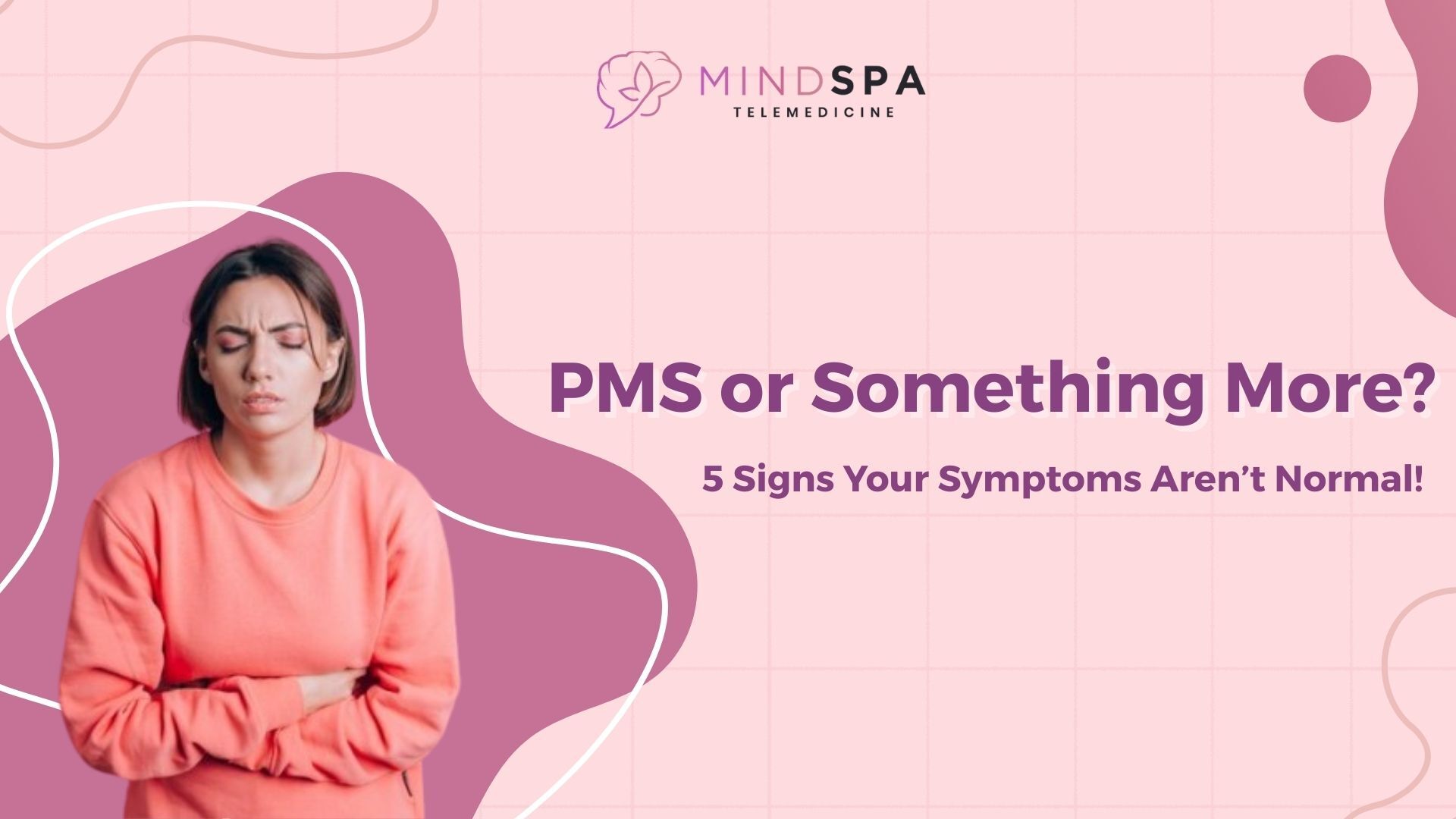Premenstrual Syndrome (PMS) is a common experience for many women, bringing with it bloating, mood swings, fatigue, and irritability. But what happens when these symptoms surpass the typical monthly discomfort? Could it be something more serious, like Premenstrual Dysphoric Disorder (PMDD), an anxiety disorder, or another underlying health issue?
Knowing the difference between standard PMS and symptoms that need medical attention is essential for maintaining both physical and mental well-being. If your monthly struggles feel more severe than what your peers describe or interfere significantly with your daily life, it might be time to look deeper.
In this article, we will explore five signs that your symptoms go beyond normal PMS and may require professional consultation.
1. Symptoms Lasting More than the Period
PMS symptoms typically begin a week or two before your period and subside once menstruation starts. If your symptoms linger well beyond your period, it could indicate an underlying issue.
Possible Causes:
- Chronic Anxiety or Stress: High stress levels and generalized anxiety can mimic PMS symptoms, causing ongoing fatigue, irritability, and body aches.
- Hormonal Imbalances: Conditions like polycystic ovary syndrome (PCOS) or thyroid disorders can cause prolonged symptoms that might be mistaken for PMS.
- Depression: Unlike PMS, which follows a cyclical pattern, depression can cause long-term emotional distress regardless of hormonal changes.
Persistent symptoms that don’t follow your usual menstrual cycle patterns require a medical evaluation.
2. When Your Mood Swings are Extreme
PMS often brings mood fluctuations, but they usually remain manageable. If you find yourself experiencing extreme mood swings, severe anger, or depressive episodes that impact your work, relationships, or personal safety, you might be dealing with something more serious.
Possible Causes:
- Premenstrual Dysphoric Disorder (PMDD): This severe form of PMS affects about 3-8% of menstruating women and is characterized by intense mood shifts, hopelessness, and even suicidal thoughts.
- Anxiety Disorder: If you feel constantly on edge, overwhelmed, or experience panic attacks, your symptoms may be related to an anxiety disorder rather than PMS.
- Major Depressive Disorder (MDD): If your low moods persist beyond your menstrual cycle and significantly impact your quality of life, depression could be the root cause.
If your emotional instability feels beyond your control and leads to self-destructive behavior, it’s essential to consult a healthcare professional immediately.
3. When You Experience Intense Anxiety or Panic Attacks
Many women with PMS report mild anxiety, but if you experience heart palpitations, intense worry, or full-blown panic attacks, PMS may not be the only factor at play.
Possible Causes:
- Generalized Anxiety Disorder (GAD): Persistent anxiety that extends beyond your menstrual cycle may indicate an anxiety disorder.
- Panic Disorder: If you experience sudden, overwhelming panic attacks unrelated to your cycle, it could be a separate mental health condition.
- PMDD: Severe anxiety and emotional distress before menstruation might be linked to PMDD rather than standard PMS.
Anxiety that affects your ability to sleep, work, or function normally should be assessed by a healthcare provider.

4. Physical Symptoms are Severe and Affect Daily Life
Bloating, mild cramps, and breast tenderness are common PMS symptoms. However, if your physical pain is severe and disrupts your ability to function, it’s a red flag.
Possible Causes:
- Endometriosis: This painful condition causes severe cramping, heavy periods, and chronic pelvic pain that can be mistaken for PMS.
- Fibroids: Uterine fibroids can lead to excessive bleeding, pain, and pressure in the lower abdomen.
- Chronic Fatigue Syndrome (CFS): If your exhaustion persists despite rest, it may indicate an underlying medical issue rather than PMS.
If you experience debilitating pain or extreme fatigue every month, it’s time to seek medical advice.

5. Your Symptoms Lead to Self-Harm or Suicidal Thoughts
This is the most serious red flag. If you experience feelings of worthlessness, despair, or thoughts of self-harm, it is not normal PMS and requires immediate attention.
Possible Causes:
- PMDD: Women with PMDD are at a higher risk of suicidal thoughts due to extreme emotional distress.
- Depression or Bipolar Disorder: If your mood swings are unpredictable and include depressive episodes, you may have an underlying mood disorder.
- Post-Traumatic Stress Disorder (PTSD): Past trauma can exacerbate emotional instability, especially during hormonal fluctuations.
If you ever feel suicidal, reach out to a trusted friend, family member, or a crisis hotline immediately. Professional support is crucial in these situations.

What Should You Do?
If you identify with any of these signs, seeking professional help is the best course of action. Here are a few steps you can take:
- Track Your Symptoms: Use a journal or a period-tracking app to record your mood, physical symptoms, and their intensity over several months.
- Consult a Health Professional: A gynecologist or mental health professional can help determine whether your symptoms are PMS, PMDD, anxiety, or other conditions.
- Consider Therapy: Cognitive Behavioral Therapy (CBT) and other counseling methods can help manage anxiety, depression, and emotional distress.
- Evaluate Lifestyle Changes: Exercise, a balanced diet, stress management techniques, and proper sleep can significantly reduce symptoms.
- Medication Options: If necessary, your doctor may prescribe hormonal treatments, antidepressants, or anti-anxiety medications to help regulate symptoms.
Conclusion
While PMS can be uncomfortable, it shouldn’t take over your life. If your symptoms are extreme, long-lasting, or interfere with your well-being, they might indicate a more serious health condition. Trust your instincts.
If something feels off, don’t hesitate to seek medical guidance. Addressing your symptoms early can lead to better treatment options and an improved quality of life. Contact Mindspa for professional help.
Frequently Asked Questions
What symptoms of PMS are not typical?
The symptoms of PMS that are not normal are called premenstrual dysphoric disorder (PMDD). PMDD signs and symptoms include mood swings, depression, anxiety, anger, tension, irritability, difficulty concentrating, and feeling overwhelmed.
How do I know if something is wrong with my period?
Regular periods are a sign that the body is working normally. Every woman should have regular periods unless she is pregnant, postmenopausal, breastfeeding, or has a medical condition that might cause them to stop. Heavy, painful, or irregular periods might indicate a serious health issue.
Can I mistake PMS for something?
Some conditions can be pretty similar to PMS, such as mood disorders like anxiety and depression, thyroid disorders, and fatigue syndrome. Healthcare providers might order tests like mood screening tests for thyroid function tests to ensure they get a precise diagnosis.


